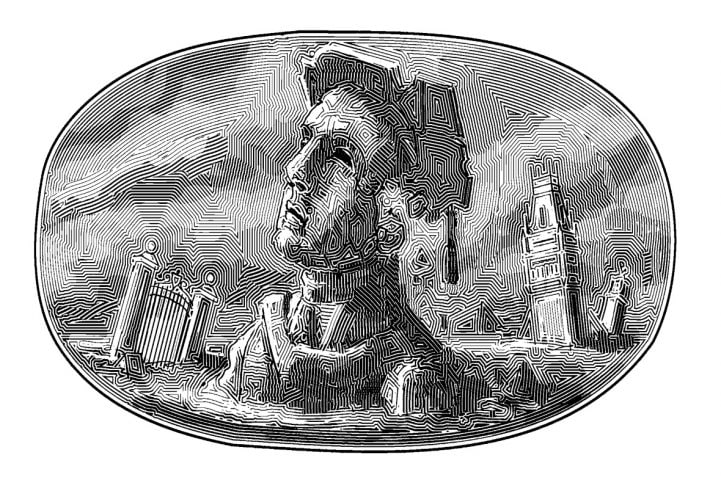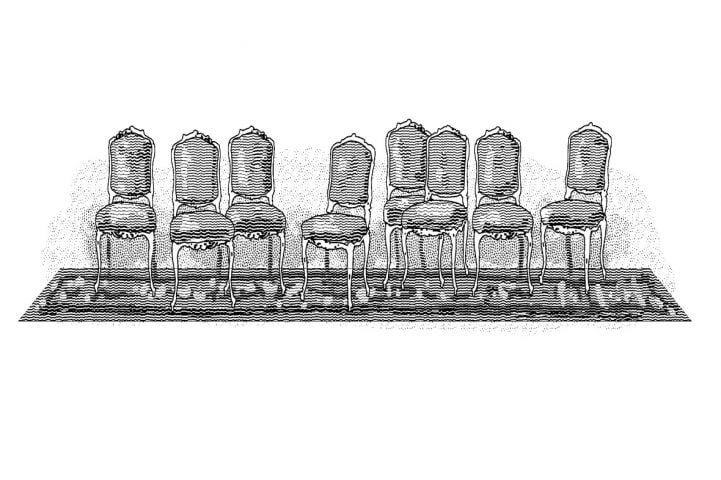Kazuo Ishiguro, the British writer best known for The Remains of the Day (1989), recently returned from a ten-year hiatus with a cunning novel, The Buried Giant. Set in a post-Arthurian Britain, it offers a brilliant metaphor for a new dark age: a mist that induces forgetfulness. As it spreads across the land, men and women forget the decades that came before, and even become vague about what happened last week. Parents misplace a child and, after a momentary panic, get caught up in some other drama, never noticing the child’s return. Minds are clouded; history has vanished. Even those who strenuously try to remember how things came to be this way can summon only fragmentary glimpses.
Ishiguro has the really good novelist’s knack for sensing cultural trends well before they become everyday realities. Never Let Me Go (2005), ostensibly about organ harvesting from human clones, conveys our growing facility at justifying horrific behavior. The Buried Giant likewise takes us into the realm of cultural amnesia.
The mist of forgetfulness is not post-Arthurian legend. It is here and now, and nowhere more potent than on campus lawns and lecture halls. What we’re forgetting is intellectual freedom.
No-Platforming
Other people, of course, have eloquently championed the principle that colleges and universities should welcome and defend open, vigorous debate. George Will recently did so at the William F. Buckley, Jr., Society’s “Disinvitation Dinner” in New York City. Victor Davis Hanson condemned universities that treat students “as if they are preteens in need of vicarious chaperones.” Even Michael Bloomberg’s 2014 Harvard commencement address chastised the university for actions “antithetical to individual rights and free societies.”
But such words are no sooner uttered than they’re enveloped in the fog of forgetfulness. We have somehow arrived at an age in which higher education can no longer bear the ideas of dissent, disagreement, or even open inquiry.
The British have a useful name for excluding unwanted views from discussion: “no-platforming.” It seems to have been around for a while as left-wing slang, but it became much more visible when the U.K. National Union of Students (NUS) adopted it as a formal policy:
[A]ny individuals or members of organisations or groups identified by the Democratic Procedures Committee as holding racist or fascist views shall not be allowed to stand for election to any National Union office, or go to, speak or take part in National Union conferences, meetings or any other National Union events, and Officers, Committee Members and Trustees shall not share a public platform with an individual or member of an organisation or group known to hold racist or fascist views.
The NUS Articles of Association spell out further details of implementing the policy: how to select people and organizations for this treatment; how to prohibit “no-platformed” individuals from running for election; and so on.
After some on the British Left realized they had created a monster, one could find left-of-center British writers denouncing the tactic. Sarah Ditum, who writes for the Guardian and the New Statesman, has traced the history of the term from its use as weapon against fascists to its current employment as a way of stigmatizing and intimidating “individuals who certainly do not trail the organised muscle of a thug army behind them.” Ditum’s example is a feminist who in 2004 criticized “gender reassignment surgery.” Despite more than ten years of groveling apologies, there are, apparently, mandatory life sentences for any and all who have been “no-platformed.” Ditum concludes, “A tool that was once intended to protect democracy from undemocratic movements has become a weapon used by the undemocratic against democracy.”
Proud Anger
The practice of no-platforming, if not the term, crossed the Atlantic some time ago. We could take an expansive view of this. Puritan Boston no-platformed religious dissenters and hanged the Quaker Mary Dyer in June 1660. We have, then, an ignoble tradition of suppressing certain kinds of dissenters, from which colleges were not exempt.
That said, things are different now. The American college campus has become one of the least open, least free places in the nation—and with respect to many subjects, not just a few. Genuine debate about abortion, affirmative action, feminism, gay marriage, global warming, gun rights, hate crimes, illegal immigration, Islam, Israel, racism, sexual assault, and transgender identity has been rendered difficult, if not impossible. And we are awash in new euphemisms for censorship: trigger warnings, safe spaces, free speech zones, fill-in-the-blank-phobic slurs, micro-aggressions, and verbal “violence.”
A substantial portion of this vocabulary derives from feminism, which has succeeded in making its anti-intellectual agenda academic dogma. Criticism of feminist concepts is recast as patriarchal, hurtful, or “violent,” obliterating the distinction between psychological discomfort and physical injury. And that erasure has inspired a thousand other complaints, delivering us to this new land where any speech that offends someone’s progressive sensibility is now deemed too “hurtful” to be uttered. Those who cross this line, deliberately or even accidentally, face vitriol, emotional bullying, and sometimes physical attack.
In 2007 I published a book, A Bee in the Mouth: Anger in America Now, on the gradual turn in American culture following World War II from our older ethic of emotional self-control to one of histrionic emotional display. My focus was on anger, once seen as a last resort and, if habitual, a character weakness. In the new era, however, anger became “empowering,” a path towards emotional self-realization, and a performance to be admired. The “new anger” I described in the book was mainly verbal and visual. It didn’t have to take the form of violence, though of course it sometimes did.
But that was then. The self-gratifications of expressive anger are now turning to physical violence or expressions of admiration for it. Read the stories that hover between justification and praise for the rioting in Ferguson, Missouri, and Baltimore to see the infatuation with burning and looting that has found a place in liberal opinion, especially on campus.
Nursing Grievance
How do we account for the exquisite sensitivity to the hint of insult, culminating in demands for trigger warnings and safe spaces, with the angry histrionics and taste for violence that characterize the campus scene? The vulnerability and volatility are two sides of the same coin. The affronted seem to be acting according to a script that says, “I suffer from having been deeply hurt…but push me a little further, and I’ll respond with unbridled rage.” Without perspective and self-control, such people misinterpret petty aggravations and annoyances as profound transgressions that become the focus of life. I resent, therefore I am. Grievances fill the vacuum left by the absence of deeper purpose, which can be grasped only through reflection and discipline. The purpose becomes, instead, carrying a mattress around on campus all year—as Columbia’s Emma Sulkowicz did—to announce to the world a violation that can never be resolved, and may never have occurred. Sulkowicz alleged that in 2012 fellow undergraduate Paul Nungesser beat, choked, and raped her. But Sulkowicz bore no bruises and exhibited no trauma, and the friendly Facebook chatter between them continued uninterrupted. Eight months later, she filed her complaint against Nungesser. Columbia investigated her claims and, in October 2013, found Nungesser “not responsible.”
The rape-culture grievance and the America-is-racist grievance are probably the most spectacular of the campus causes. I am more directly involved, however, with the global-warming/divestment/sustainability grievance. Earlier this year my co-author Rachelle Peterson and I published Sustainability: Higher Education’s New Fundamentalism, a lengthy examination of how this movement became a dominant ideology on American campuses. Documenting its rise has been one of my concerns for the last seven years, during which I’ve probably come to know more about it than anyone not actually part of it. In principle, my outsider perspective might have some value to the movement’s insiders. They surely have nothing to fear at this point, with 697 colleges officially “committed” to the cause and many more only a half-step behind.
But oddly, this extraordinarily successful movement is also extraordinarily unwilling to allow even temperate critics to be heard. I know this first-hand from my efforts to speak on campuses, but participants in the movement itself have gotten around to noticing the silence. Eric B. Kennedy, a graduate student at Arizona State University, and Jacqueline Ho, at the environmentalist think tank Resources for the Future, have reported on a survey of undergraduate environmental studies programs across the country. They observed that in their sample of 1,500 such programs, there is very little recognition of intellectual controversy, of “competing or contested solutions to environmental problems.” Diverse viewpoints, even within the sustainability rubric, are generally ignored—never mind views that challenge the framework.
This de facto no-platforming might seem benign. No disagreement means no controversy, which means no emotional turbulence. The tranquility ends, of course, the moment anyone challenges the orthodoxy: there’s no missing the vehement attacks on “climate deniers,” and the fierce determination to prevent dissenters of any sort from gaining access to the mainstream media, academic journals, or campus lecture halls.
Daring to Doubt
The “consensus” scientists have reached on global warming includes real disagreements and uncertainties. Thousands of well-informed scientists reject the so-called consensus models, and among these skeptics are figures of high standing, including the Institute for Advanced Study physicist Freeman Dyson. Dyson’s stature is such that National Public Radio recently broke from routinely denying global warming skeptics its platform, allowing Dyson to say on air that he is skeptical of global warming theory: “I don’t think the science is at all clear, and unfortunately a lot of the experts really believe they understand it, and maybe have the wrong answer.”
Never mind Dyson’s eminence. NPR listeners rushed to their keyboards, demanding that “real climatologists” be given the microphone. “Would NPR do a segment on a Dole Corporation ‘scientist’s’ claim that bananas cure cancer?” “Well, there’s no fool like an old fool.” “Why are you giving this doddering dinosaur free advertising for his upcoming book? Why is NPR giving ANY airtime and credibility to a Climate Change sceptic?”
And so on. A similar sort of controversy has broken out at Boston University, where an advisory committee to the board of trustees released an analysis of the “fossil fuel issue.” The committee summarized both sides of the debate without reaching a conclusion. But just by paying serious attention to dissenters’ views, it violated the diktat that the “debate is over” since we have “scientific consensus.” Almost immediately, sustainability advocates’ comments and editorials declared that “climate change deniers” were at work with “embarrassingly sketchy scholarship,” and in violation of ethical standards. The document was declared “very simplistic” and the committee accused of having been “purchased” by fossil fuel interests.
The Dyson interview and B.U. advisory committee report are the exceptions. As a rule, dissenters from the global warming orthodoxy receive no platform where laymen might actually hear their views. In both cases, dissent was registered calmly, while the reaction from the “consensus” community was furious indignation. Given what happens when well-informed observers dare to speak, those not so well informed can draw the obvious lesson: if one harbors doubts about global warming theory, better to remain silent.
What today’s enforcers of orthodoxy forget is that intellectual freedom is the foundation of the university, the press, and a free society. Suppressing that freedom gives a temporary advantage to favored ideas, but the habit of self-righteous oppression will eventually swallow those who first enforced it. In 2003, Jonathan Chait pushed the boundaries of civil discourse by opening an essay in the New Republic, “I hate President George W. Bush. There I said it.” In January 2015, Chait wrote an essay in New York Magazine, bitterly complaining about the stranglehold of political correctness on campus. He observed how “the more radical members of the left attempt to regulate political discourse by defining opposing views as bigoted and illegitimate.” Chait himself spent decades as an enforcer of such measures but now finds himself thrust to the side by the more Jacobin wing of the progressive movement. It is a lesson the current climate bullies, “rape culture” feminists, and Ferguson organizers might benefit from—except that in the place of history they have only an inventory of false but endlessly repeated talking points.
Cultural amnesia, on and off campus, imprisons people in their own angry self-actualization. The mist that settled over ancient Britain in Ishiguro’s tale? It was a kind of dragon’s breath, aimed at preparing people for subjugation. Those of us who wish to dispel it will first have to find ways to awaken those all too content to slumber.



